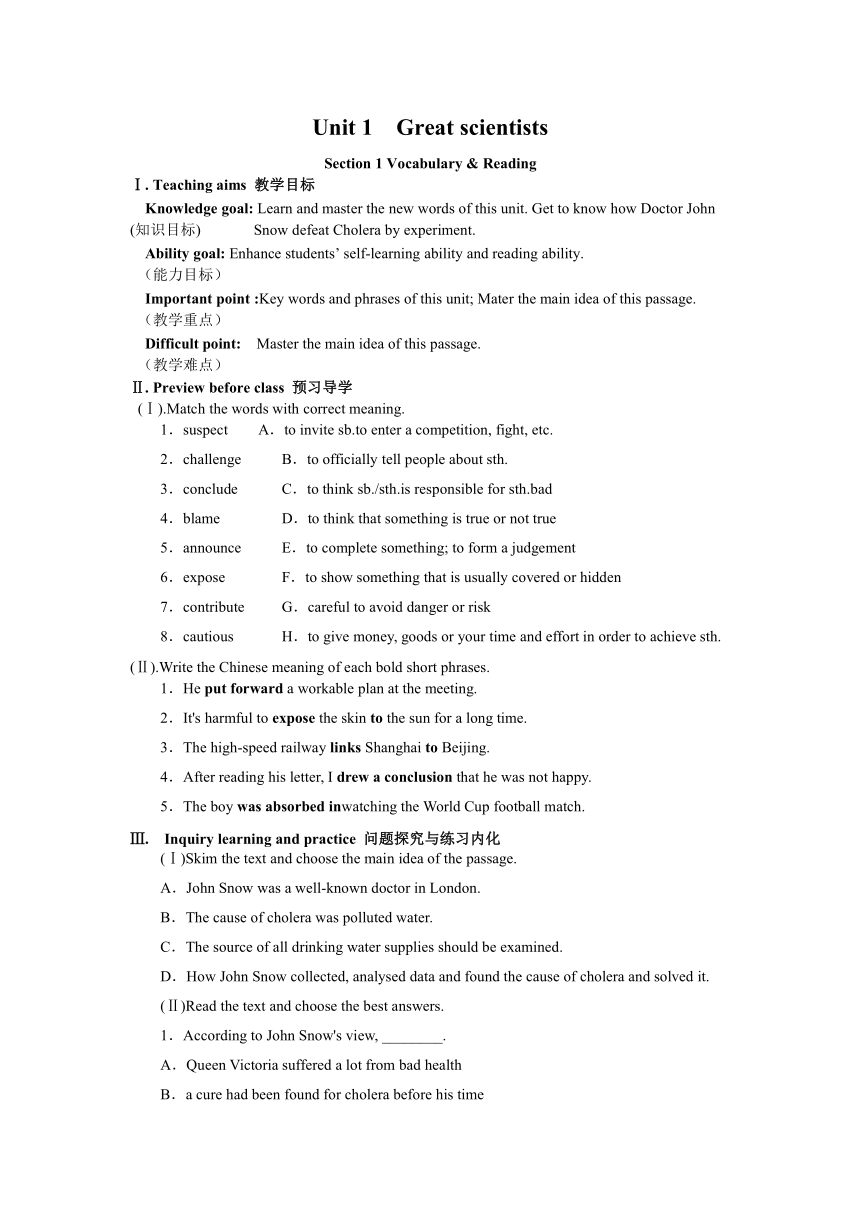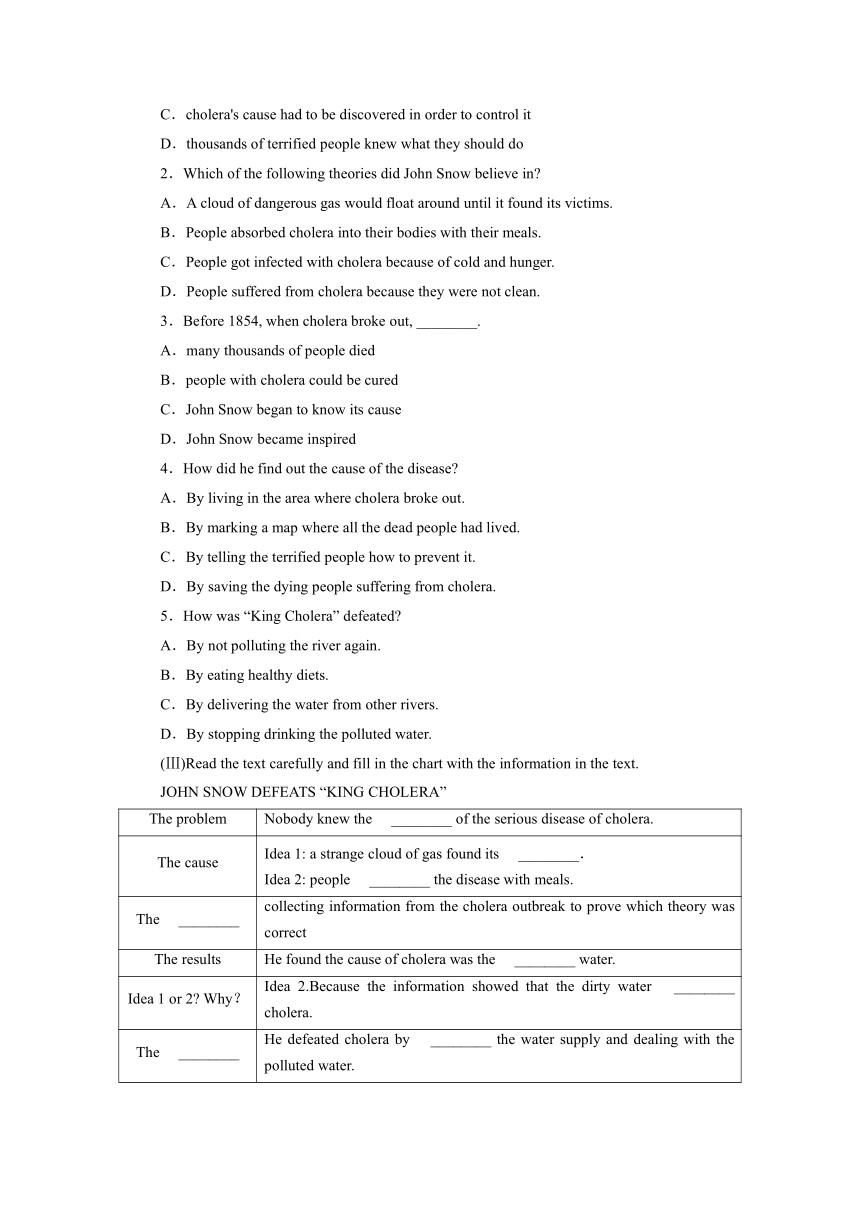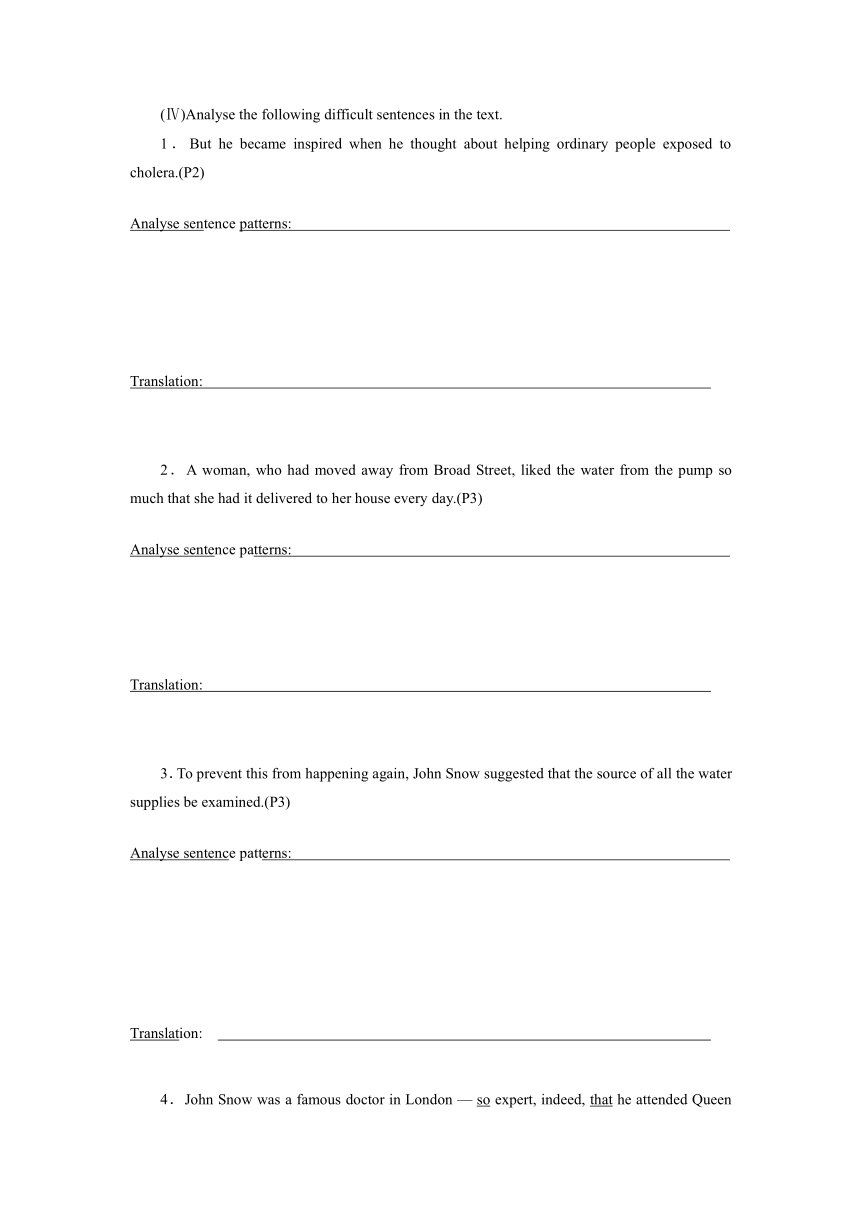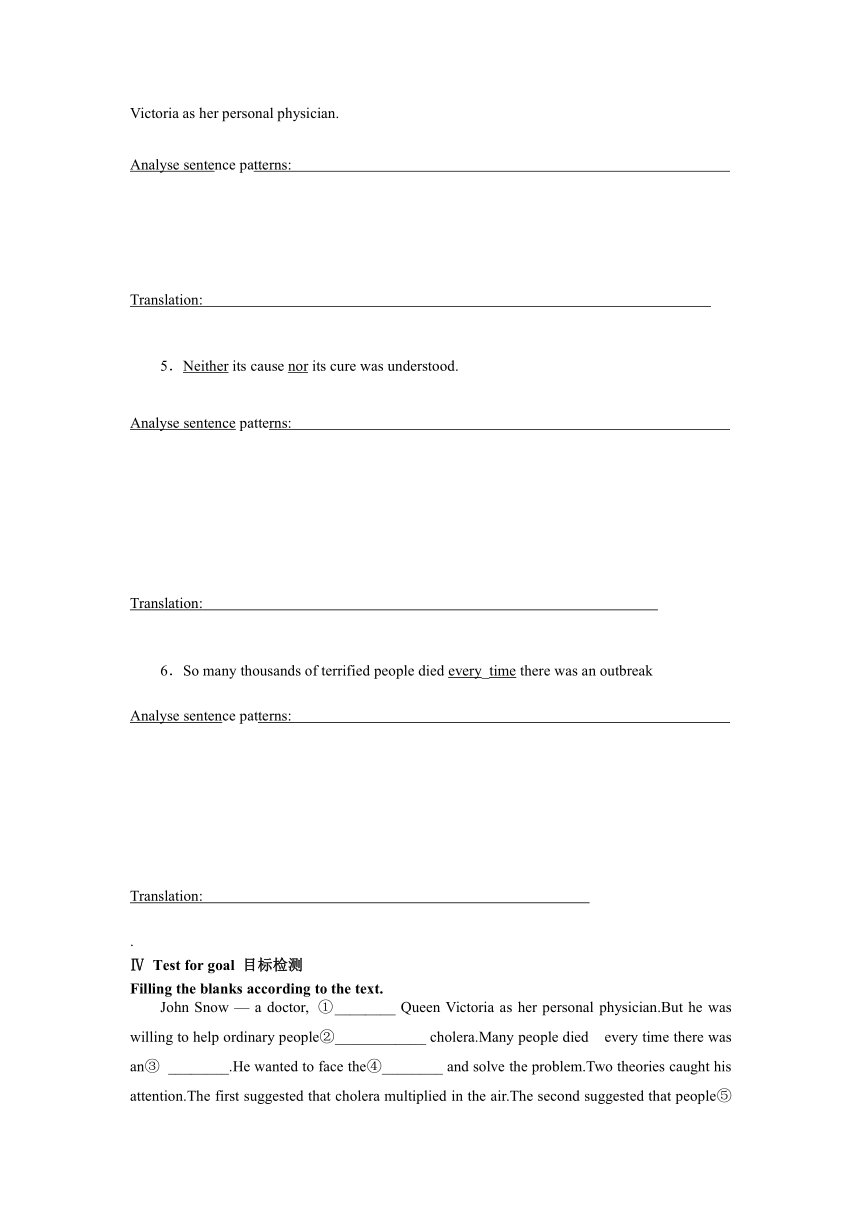高中英语人教新课标必修五Unit 1 Great Scientists Vocabulary and Reading导学案
文档属性
| 名称 | 高中英语人教新课标必修五Unit 1 Great Scientists Vocabulary and Reading导学案 |  | |
| 格式 | zip | ||
| 文件大小 | 24.9KB | ||
| 资源类型 | 教案 | ||
| 版本资源 | 人教版(新课程标准) | ||
| 科目 | 英语 | ||
| 更新时间 | 2015-12-06 19:24:11 | ||
图片预览




文档简介
Unit 1 Great scientists
Section 1 Vocabulary & Reading
Ⅰ. Teaching aims 教学目标
Knowledge goal: Learn and master the new words of this unit. Get to know how Doctor John
(知识目标) Snow defeat Cholera by experiment.
Ability goal: Enhance students’ self-learning ability and reading ability.
(能力目标)
Important point :Key words and phrases of this unit; Mater the main idea of this passage.
(教学重点)
Difficult point: Master the main idea of this passage.
(教学难点)
Ⅱ. Preview before class 预习导学
(Ⅰ).Match the words with correct meaning.
1.suspect A.to invite sb.to enter a competition, fight, etc.
2.challenge B.to officially tell people about sth.
3.conclude C.to think sb./sth.is responsible for sth.bad
4.blame D.to think that something is true or not true
5.announce E.to complete something; to form a judgement
6.expose F.to show something that is usually covered or hidden
7.contribute G.careful to avoid danger or risk
8.cautious H.to give money, goods or your time and effort in order to achieve sth.
(Ⅱ).Write the Chinese meaning of each bold short phrases.
1.He put forward a workable plan at the meeting.
2.It's harmful to expose the skin to the sun for a long time.
3.The high-speed railway links Shanghai to Beijing.
4.After reading his letter, I drew a conclusion that he was not happy.
5.The boy was absorbed inwatching the World Cup football match.
Ⅲ. Inquiry learning and practice 问题探究与练习内化
(Ⅰ)Skim the text and choose the main idea of the passage.
A.John Snow was a well-known doctor in London.
B.The cause of cholera was polluted water.
C.The source of all drinking water supplies should be examined.
D.How John Snow collected, analysed data and found the cause of cholera and solved it.
(Ⅱ)Read the text and choose the best answers.
1.According to John Snow's view, ________.
A.Queen Victoria suffered a lot from bad health
B.a cure had been found for cholera before his time
C.cholera's cause had to be discovered in order to control it
D.thousands of terrified people knew what they should do
2.Which of the following theories did John Snow believe in?
A.A cloud of dangerous gas would float around until it found its victims.
B.People absorbed cholera into their bodies with their meals.
C.People got infected with cholera because of cold and hunger.
D.People suffered from cholera because they were not clean.
3.Before 1854, when cholera broke out, ________.
A.many thousands of people died
B.people with cholera could be cured
C.John Snow began to know its cause
D.John Snow became inspired
4.How did he find out the cause of the disease?
A.By living in the area where cholera broke out.
B.By marking a map where all the dead people had lived.
C.By telling the terrified people how to prevent it.
D.By saving the dying people suffering from cholera.
5.How was “King Cholera” defeated?
A.By not polluting the river again.
B.By eating healthy diets.
C.By delivering the water from other rivers.
D.By stopping drinking the polluted water.
(Ⅲ)Read the text carefully and fill in the chart with the information in the text.
JOHN SNOW DEFEATS “KING CHOLERA”
The problem
Nobody knew the ?________ of the serious disease of cholera.
The cause
Idea 1: a strange cloud of gas found its ?________.
Idea 2: people ?________ the disease with meals.
The ?________
collecting information from the cholera outbreak to prove which theory was correct
The results
He found the cause of cholera was the ?________ water.
Idea 1 or 2? Why?
Idea 2.Because the information showed that the dirty water ?________ cholera.
The ?________
He defeated cholera by ?________ the water supply and dealing with the polluted water.
(Ⅳ)Analyse the following difficult sentences in the text.
1.But he became inspired when he thought about helping ordinary people exposed to cholera.(P2)
Analyse sentence patterns:
Translation:
2.A woman, who had moved away from Broad Street, liked the water from the pump so much that she had it delivered to her house every day.(P3)
Analyse sentence patterns:
Translation:
3.To prevent this from happening again, John Snow suggested that the source of all the water supplies be examined.(P3)
Analyse sentence patterns:
Translation:
4.John Snow was a famous doctor in London — so expert, indeed, that he attended Queen Victoria as her personal physician.
Analyse sentence patterns:
Translation:
5.Neither its cause nor its cure was understood.
Analyse sentence patterns:
Translation:
6.So many thousands of terrified people died every_time there was an outbreak
Analyse sentence patterns:
Translation:
.
Ⅳ Test for goal 目标检测
Filling the blanks according to the text.
John Snow — a doctor, ①________ Queen Victoria as her personal physician.But he was willing to help ordinary people②____________ cholera.Many people died every time there was an③ ________.He wanted to face the④________ and solve the problem.Two theories caught his attention.The first suggested that cholera multiplied in the air.The second suggested that people⑤________ this disease into their bodies and the disease attacked the body.John Snow⑥________ the second was right but he needed evidence.When another outbreak hit London in 1854, he was ready to begin his⑦________ and tried to get information.He found that most of the deaths were near a water pump and the spread of the disease was⑧________ water.With the evidence, he was able to⑨________ that polluted water carried the virus.After that, he suggested the source of all the water supplies be examined.Finally “King Cholera” was⑩________.
Ⅴ. Exercises after class 分层配餐
(Ⅰ).filling the blanks with correct words and phrases according to Chinese meaning.
1.vt.打败;战胜;使受挫n.失败
2.adj.熟练的;经验或知识丰富的n.专家;行家
3.vt.照顾;护理;出席;参加
4.vt.暴露;揭露;使曝光
5.n.治愈;痊愈vt.治愈;治疗
6.vt.认为;怀疑n.被怀疑者;嫌疑犯
7.n.柄;把手vt.处理;操纵
8.vt.&n.连接;联系
9.n.特征;特性→n.(事物的)特性;性质;(人的)品质;性格
10.vt.&vi.结束;推断出→n.结论;结束
11.vt.吸收;吸引;使专心→adj.全神贯注的;一心一意的
12.vt.污染;弄脏→n.污染
13.vt.宣布;通告→n.宣告;宣布→n.播音员;宣告者
14.put 提出
15.draw a 得出结论
16.expose ...使显露;暴露
17.link ...... 将……和……联系或连接起来
18.be absorbed 专心于;全神贯注于
19.be to该受责备;应负责
(Ⅱ).Filling the blanks with the correct forms of the giving words.
1. The laboratory animals have been with the bacteria, which are highly .Any of you should avoid being exposed to .(infect)
2.He was interested in when he was young.After he grew up to be a ,he liked to do experiments to test his ideas.(science)
3.As experienced ,both of you must try to the causes of the strike, and present a detailed of the situation.(analyse)
4.The old man often us how to behave well in public and his made a deep impression on us.(instruct)
5.He was infected with bacteria last month, and five days later.His is a great loss to our career.(die)
(Ⅲ) Reading comprehension
Stephen William Hawking was born on 8 January 1942 (300 years after the death of Calileo) in Oxford, England.His parents' house was in north London, but during the Second World War Oxford was considered a safer place to have babies.When he was eight, his family moved to St Albans, a town about 20 miles north of London.At eleven Stephen went to St Albans School, and then on to University College, Oxford, his father's old college.Stephen wanted to do Mathematics, although his father would have preferred medicine.Mathematics was not available at University College, so he did Physics instead.After three years and not very much work he was awarded a first class honors degree in Natural Science.
Stephen then went on to Cambridge to do research in Cosmology, there being no one working in that area in Oxford at the time.His supervisor was Denis Sciama, although he had hoped to get Fred Hoyle who was working in Cambridge.After gaining his Ph.D,he became first a Research Fellow, and later on a Professorial Fellow at Gonville and Caius College.After leaving the Institute of Astronomy in 1973 Stephen came to the Department of Applied Mathematics and Theoretical Physics, and since 1979 has held the post of Lucasian Professor of Mathematics.The chair was founded in 1663 with money left in the will of the Reverend Henry Lucas, who had been the Member of Parliament for the University.It was first held by Isaac Barrow, and then in 1663 by Isaac Newton.
Professor Hawking has twelve honorary degrees, was awarded the CBE in 1982, and was made a Companion of Honour in 1989.He is the recipient of many awards, medals and prizes and is a Fellow of The Royal Society and a Member of the US National Academy of Sciences.
1.At his teenage, Stephen W.Hawking went to the same college as________.
A.Galileo B.his father
C.Isaac Barrow D.Isaac Newton
2.Which of the following shows the right order of what happened to Hawking?
a.He gained his Ph.D.
b.He went to Cambridge.
c.He was given a first class honors degree.
d.He began to hold the post of Lucasian Professor of Mathematics.
e.He went to St Albans School.
A.e-c-b-a-d B.a-e-c-d-b
C.a-e-c-b-d D.c-b-d-e-a
3.According to the passage, Stephen W.Hawking had never spent much time studying________.
A.Cosmology B.Mathematics
C.Physics D.Medicine
4.Before Stephen Hawking went to Cambridge, ________.
A.there was no one studying Cosmology in England
B.there was no one studying Cosmology in Oxford
C.there were only a few scientists studying Cosmology in Oxford
D.Cosmology is widely studied in Britain
参考答案
Ⅱ.预习导学
(Ⅰ)1~8 DAECBFHG
(Ⅱ)1.提出
2.使显露;暴露
3.将……和……联系或连接起来
4.得出结论
5.全神贯注于……
Ⅲ. 问题探究与练习内化
(Ⅰ)D
(Ⅱ)1~5 CBABD
(Ⅲ)cause?victims absorbed method ?polluted ?carried conclusion ?examining
Ⅳ.目标检测
?attended exposed to ?outbreak ?challenge absorbed ?suspected enquiry ?linked to announce defeated
Ⅴ.分层配餐
(Ⅰ)1.defeat 2.expert 3.attend4.expose 5.cure 6.suspect 7.handle8.link 9.characteristic→character
10.conclude→conclusion
11.absorb →absorbed
12.pollute→pollution
13.announce→announcement→announcer
14.forward15.conclusion 16.to17.to 18. in 19.blame
(Ⅱ)1. infected ,infectious,infection
2.science ,scientist, scientific
3.analysts,analyse, analysis
4.instructed ,instruction
5.deadly ,died , death
(Ⅲ)语篇解读:本文主要介绍了英国著名科学家霍金的生平。
【解析】细节理解题。根据文中第一段第四句“At eleven Stephen went to St Albans School, and then on to University College, Oxford, his father's old college.”可知他和他父亲上了同一所大学。
【答案】B
2. 【解析】细节理解题。阅读全文可了解事情发生的先后顺序。
【答案】A
3. 【解析】细节理解题。阅读文章,通过排除法可知答案。文中的第一段倒数第二句提到了Physics;第二段第一句提到了Cosmology;同一段第四句提到了他学了Mathematics。而根据第一段可知Medicine只不过是他父亲希望他学的专业而已。
【答案】D
4. 【解析】细节理解题。文中第二段第一句话“...there being no one working in that area in Oxford at the time.”可知在那时牛津大学,没有人研究宇宙学,因此答案是B。
【答案】B
Section 1 Vocabulary & Reading
Ⅰ. Teaching aims 教学目标
Knowledge goal: Learn and master the new words of this unit. Get to know how Doctor John
(知识目标) Snow defeat Cholera by experiment.
Ability goal: Enhance students’ self-learning ability and reading ability.
(能力目标)
Important point :Key words and phrases of this unit; Mater the main idea of this passage.
(教学重点)
Difficult point: Master the main idea of this passage.
(教学难点)
Ⅱ. Preview before class 预习导学
(Ⅰ).Match the words with correct meaning.
1.suspect A.to invite sb.to enter a competition, fight, etc.
2.challenge B.to officially tell people about sth.
3.conclude C.to think sb./sth.is responsible for sth.bad
4.blame D.to think that something is true or not true
5.announce E.to complete something; to form a judgement
6.expose F.to show something that is usually covered or hidden
7.contribute G.careful to avoid danger or risk
8.cautious H.to give money, goods or your time and effort in order to achieve sth.
(Ⅱ).Write the Chinese meaning of each bold short phrases.
1.He put forward a workable plan at the meeting.
2.It's harmful to expose the skin to the sun for a long time.
3.The high-speed railway links Shanghai to Beijing.
4.After reading his letter, I drew a conclusion that he was not happy.
5.The boy was absorbed inwatching the World Cup football match.
Ⅲ. Inquiry learning and practice 问题探究与练习内化
(Ⅰ)Skim the text and choose the main idea of the passage.
A.John Snow was a well-known doctor in London.
B.The cause of cholera was polluted water.
C.The source of all drinking water supplies should be examined.
D.How John Snow collected, analysed data and found the cause of cholera and solved it.
(Ⅱ)Read the text and choose the best answers.
1.According to John Snow's view, ________.
A.Queen Victoria suffered a lot from bad health
B.a cure had been found for cholera before his time
C.cholera's cause had to be discovered in order to control it
D.thousands of terrified people knew what they should do
2.Which of the following theories did John Snow believe in?
A.A cloud of dangerous gas would float around until it found its victims.
B.People absorbed cholera into their bodies with their meals.
C.People got infected with cholera because of cold and hunger.
D.People suffered from cholera because they were not clean.
3.Before 1854, when cholera broke out, ________.
A.many thousands of people died
B.people with cholera could be cured
C.John Snow began to know its cause
D.John Snow became inspired
4.How did he find out the cause of the disease?
A.By living in the area where cholera broke out.
B.By marking a map where all the dead people had lived.
C.By telling the terrified people how to prevent it.
D.By saving the dying people suffering from cholera.
5.How was “King Cholera” defeated?
A.By not polluting the river again.
B.By eating healthy diets.
C.By delivering the water from other rivers.
D.By stopping drinking the polluted water.
(Ⅲ)Read the text carefully and fill in the chart with the information in the text.
JOHN SNOW DEFEATS “KING CHOLERA”
The problem
Nobody knew the ?________ of the serious disease of cholera.
The cause
Idea 1: a strange cloud of gas found its ?________.
Idea 2: people ?________ the disease with meals.
The ?________
collecting information from the cholera outbreak to prove which theory was correct
The results
He found the cause of cholera was the ?________ water.
Idea 1 or 2? Why?
Idea 2.Because the information showed that the dirty water ?________ cholera.
The ?________
He defeated cholera by ?________ the water supply and dealing with the polluted water.
(Ⅳ)Analyse the following difficult sentences in the text.
1.But he became inspired when he thought about helping ordinary people exposed to cholera.(P2)
Analyse sentence patterns:
Translation:
2.A woman, who had moved away from Broad Street, liked the water from the pump so much that she had it delivered to her house every day.(P3)
Analyse sentence patterns:
Translation:
3.To prevent this from happening again, John Snow suggested that the source of all the water supplies be examined.(P3)
Analyse sentence patterns:
Translation:
4.John Snow was a famous doctor in London — so expert, indeed, that he attended Queen Victoria as her personal physician.
Analyse sentence patterns:
Translation:
5.Neither its cause nor its cure was understood.
Analyse sentence patterns:
Translation:
6.So many thousands of terrified people died every_time there was an outbreak
Analyse sentence patterns:
Translation:
.
Ⅳ Test for goal 目标检测
Filling the blanks according to the text.
John Snow — a doctor, ①________ Queen Victoria as her personal physician.But he was willing to help ordinary people②____________ cholera.Many people died every time there was an③ ________.He wanted to face the④________ and solve the problem.Two theories caught his attention.The first suggested that cholera multiplied in the air.The second suggested that people⑤________ this disease into their bodies and the disease attacked the body.John Snow⑥________ the second was right but he needed evidence.When another outbreak hit London in 1854, he was ready to begin his⑦________ and tried to get information.He found that most of the deaths were near a water pump and the spread of the disease was⑧________ water.With the evidence, he was able to⑨________ that polluted water carried the virus.After that, he suggested the source of all the water supplies be examined.Finally “King Cholera” was⑩________.
Ⅴ. Exercises after class 分层配餐
(Ⅰ).filling the blanks with correct words and phrases according to Chinese meaning.
1.vt.打败;战胜;使受挫n.失败
2.adj.熟练的;经验或知识丰富的n.专家;行家
3.vt.照顾;护理;出席;参加
4.vt.暴露;揭露;使曝光
5.n.治愈;痊愈vt.治愈;治疗
6.vt.认为;怀疑n.被怀疑者;嫌疑犯
7.n.柄;把手vt.处理;操纵
8.vt.&n.连接;联系
9.n.特征;特性→n.(事物的)特性;性质;(人的)品质;性格
10.vt.&vi.结束;推断出→n.结论;结束
11.vt.吸收;吸引;使专心→adj.全神贯注的;一心一意的
12.vt.污染;弄脏→n.污染
13.vt.宣布;通告→n.宣告;宣布→n.播音员;宣告者
14.put 提出
15.draw a 得出结论
16.expose ...使显露;暴露
17.link ...... 将……和……联系或连接起来
18.be absorbed 专心于;全神贯注于
19.be to该受责备;应负责
(Ⅱ).Filling the blanks with the correct forms of the giving words.
1. The laboratory animals have been with the bacteria, which are highly .Any of you should avoid being exposed to .(infect)
2.He was interested in when he was young.After he grew up to be a ,he liked to do experiments to test his ideas.(science)
3.As experienced ,both of you must try to the causes of the strike, and present a detailed of the situation.(analyse)
4.The old man often us how to behave well in public and his made a deep impression on us.(instruct)
5.He was infected with bacteria last month, and five days later.His is a great loss to our career.(die)
(Ⅲ) Reading comprehension
Stephen William Hawking was born on 8 January 1942 (300 years after the death of Calileo) in Oxford, England.His parents' house was in north London, but during the Second World War Oxford was considered a safer place to have babies.When he was eight, his family moved to St Albans, a town about 20 miles north of London.At eleven Stephen went to St Albans School, and then on to University College, Oxford, his father's old college.Stephen wanted to do Mathematics, although his father would have preferred medicine.Mathematics was not available at University College, so he did Physics instead.After three years and not very much work he was awarded a first class honors degree in Natural Science.
Stephen then went on to Cambridge to do research in Cosmology, there being no one working in that area in Oxford at the time.His supervisor was Denis Sciama, although he had hoped to get Fred Hoyle who was working in Cambridge.After gaining his Ph.D,he became first a Research Fellow, and later on a Professorial Fellow at Gonville and Caius College.After leaving the Institute of Astronomy in 1973 Stephen came to the Department of Applied Mathematics and Theoretical Physics, and since 1979 has held the post of Lucasian Professor of Mathematics.The chair was founded in 1663 with money left in the will of the Reverend Henry Lucas, who had been the Member of Parliament for the University.It was first held by Isaac Barrow, and then in 1663 by Isaac Newton.
Professor Hawking has twelve honorary degrees, was awarded the CBE in 1982, and was made a Companion of Honour in 1989.He is the recipient of many awards, medals and prizes and is a Fellow of The Royal Society and a Member of the US National Academy of Sciences.
1.At his teenage, Stephen W.Hawking went to the same college as________.
A.Galileo B.his father
C.Isaac Barrow D.Isaac Newton
2.Which of the following shows the right order of what happened to Hawking?
a.He gained his Ph.D.
b.He went to Cambridge.
c.He was given a first class honors degree.
d.He began to hold the post of Lucasian Professor of Mathematics.
e.He went to St Albans School.
A.e-c-b-a-d B.a-e-c-d-b
C.a-e-c-b-d D.c-b-d-e-a
3.According to the passage, Stephen W.Hawking had never spent much time studying________.
A.Cosmology B.Mathematics
C.Physics D.Medicine
4.Before Stephen Hawking went to Cambridge, ________.
A.there was no one studying Cosmology in England
B.there was no one studying Cosmology in Oxford
C.there were only a few scientists studying Cosmology in Oxford
D.Cosmology is widely studied in Britain
参考答案
Ⅱ.预习导学
(Ⅰ)1~8 DAECBFHG
(Ⅱ)1.提出
2.使显露;暴露
3.将……和……联系或连接起来
4.得出结论
5.全神贯注于……
Ⅲ. 问题探究与练习内化
(Ⅰ)D
(Ⅱ)1~5 CBABD
(Ⅲ)cause?victims absorbed method ?polluted ?carried conclusion ?examining
Ⅳ.目标检测
?attended exposed to ?outbreak ?challenge absorbed ?suspected enquiry ?linked to announce defeated
Ⅴ.分层配餐
(Ⅰ)1.defeat 2.expert 3.attend4.expose 5.cure 6.suspect 7.handle8.link 9.characteristic→character
10.conclude→conclusion
11.absorb →absorbed
12.pollute→pollution
13.announce→announcement→announcer
14.forward15.conclusion 16.to17.to 18. in 19.blame
(Ⅱ)1. infected ,infectious,infection
2.science ,scientist, scientific
3.analysts,analyse, analysis
4.instructed ,instruction
5.deadly ,died , death
(Ⅲ)语篇解读:本文主要介绍了英国著名科学家霍金的生平。
【解析】细节理解题。根据文中第一段第四句“At eleven Stephen went to St Albans School, and then on to University College, Oxford, his father's old college.”可知他和他父亲上了同一所大学。
【答案】B
2. 【解析】细节理解题。阅读全文可了解事情发生的先后顺序。
【答案】A
3. 【解析】细节理解题。阅读文章,通过排除法可知答案。文中的第一段倒数第二句提到了Physics;第二段第一句提到了Cosmology;同一段第四句提到了他学了Mathematics。而根据第一段可知Medicine只不过是他父亲希望他学的专业而已。
【答案】D
4. 【解析】细节理解题。文中第二段第一句话“...there being no one working in that area in Oxford at the time.”可知在那时牛津大学,没有人研究宇宙学,因此答案是B。
【答案】B
